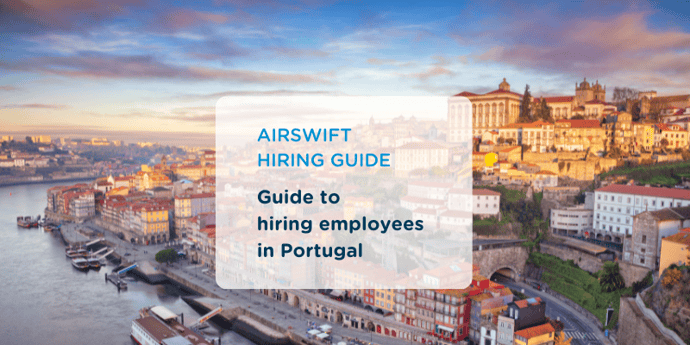
By
Leanna Seah
September 20, 2024
Updated
October 29, 2024

Overview
Portugal is a European country located on the Iberian Peninsula in the very southwestern portion of the continent. The country is home to a highly qualified employee population of roughly 5.9 million people that are part of major industries such as textiles, clothing, auto-part manufacturing, dairy, wine, technology, tourism and construction.
As a highly developed country, Portugal has a Human Development Index (HDI) of 0,795 (40th in the world) and a GDP of USD249,9 billion as of 2020. In general, there’s a great quality of life with a great security index, low cost of living compared to neighboring countries, and a good life expectancy of 81 years.
English speakers are widely found in Portugal, especially in the larger cities and in the Algarve area. Because of that, foreign workers have an easier time settling in and starting their jobs. With its steady economic growth and consistently low unemployment rate, Portugal can be a great place for international companies to consider while expanding and building new operations.
| Capital | Lisbon |
| Languages spoken | Portuguese |
| Population size | 10,3 million |
| Payroll frequency | Monthly |
| Currency | Euro (€) |
| VAT | VAT varies between 23%, 13% and 6% depending on the service/goods and what part of Portugal the company is settled in. |
Payroll and taxes
Workers' contributions depend on whether they are residents or not. In order to be considered a resident, the individual must spend more than 183 days per year within the country or have an abode in Portugal as permanent residence. Residents pay based on their worldwide income, and non residents pay just for their earnings in Portugal.
Employer contributions
Employer payroll contributions consists of three main different taxes:
- Social Security - 23.5% (of gross salary of each worker)
- Labor Accident Insurance - 1.75%
- Wage Guarantee Fund - 1%
The registration of employees with Social Security is the responsibility of the employer. They must provide information such as their address and Número de Identificação Social (NISS), as well as their civil identification documents and Tax Identification Number (NIF). Social Security contribution is the only contribution to the government that is shared with the employee.
Employee contributions
Workers' contributions depend on whether they are residents or not. In order to be considered a resident, the individual must spend more than 183 days per year within the country or have an abode in Portugal as permanent residence. Residents pay based on their worldwide income, and non residents pay just for their earnings in Portugal.
Income tax
Non-residents pay a flat tax of 28%.
For residents, it is an income progressive scale, depending on annual income:
In addition to income tax, workers with an annual income of €80,000 to €250,000 are subject to a solidarity surtax of 2.5%, and those with an annual income over €250,000 must pay the same surtax with a rate of 5%. This is a way to tax the ones with higher income and maintain lower rates for employees at a lower income bracket.
Withholding income tax and remitting the payments to the government is the responsibility of the employers. All employers must file these taxes on a monthly basis and also provide the workforce with an annual tax summary by the end of January in the following year.
The only exceptions in Portugal are the regions of Azores and Madeira, which have their own income tax rates.
Social security contribution
All workers are required to contribute a fixed rate of 11% to the social security office in Portugal.
Minimum wage
Minimum Wage in Portugal is fixed at €705 per month, up to a total annual salary of €9,870, taking into account 14 payments per year. There’s two extra payments, one in July and one in December, known as Summer and Christmas salaries. This is also one of the main employee benefits in Portugal.
Working hours
Working hours in Portugal are typically eight hours per day, usually between 9 am to 6 pm, with a one-hour lunch break. Employment contracts may differ and workers can choose to have a two-hour lunch break as well, and extend their day up until 7 pm.
Overtime
There’s a special flexible working scheme that employees can put in place in order to extend the hour limitations up to 12 hours a day and 60 hours a week. The examples are:
- Adaptability regime, in which the standard working period is defined on an average basis
- The bank of hours regime, in which the employee can “store” time
- The concentrated working period regime, in which the working period is condensed into three to four days per week
The average working time cannot exceed 48 hours per week.
Employees have the option to opt-out of working-time limits and choose to be paid extra instead. If their role is in management, they might also have the option of waiving the right to receive an additional wage.
Overtime compensation
In Portugal, overtime can only be provided when the company has to deal with a possible and transitory increase in work. The admission of new workers cannot be justified as overtime, but indispensable work to prevent or repair problems within the company are justified. All employees must do overtime work if requested unless they ask to be exempted for extenuating reasons.
Workers that are working over the maximum hours must receive the following overtime compensation:
- Hourly rate plus 25% for the first hour
- Hourly rate plus 37.5% for any additional hours
- Hourly rate plus 50% for any overtime hour on rest days
Overtime should not exceed two hours daily (for a maximum of 48 weekly) or 150 hours yearly for employees at companies with 50 employees or more and 175 hours for companies with fewer than 50 employees. The limit per year increases to 200 annually if within a collective labor agreement. This hour control is obliged to be tracked by the employer.
Employee benefits
13th and 14th-month salary
In Portugal, as said before, employees are entitled to two extra salaries per year. One in June, and one in December popularly known as the Summer and Christmas salaries. There’s a need to sign a written agreement stating that both 50% of this salaries will be paid on the due dates and the rest will be paid 12 times, together with the monthly payment.

Basic insurance
It is mandatory for workers to contribute to Social Security in Portugal. Everyone that contributes is covered for healthcare, pension funds, unemployment aid and paid parental leave by the government.
Wage fund
Companies have to contribute 1% of each employee's gross income to the Working Compensation Fund of Portugal and the Working Compensation Warranty Fund. This contribution protects workers from risks related to not getting their salaries or other financial problems that their employers might have.
Compensation insurance
Compensation insurance covers workers for accidents at, on the way to and from work. The goal of the insurance is to give employees and their families additional coverage in case of death, permanent or temporary disabilities and more.
Types of leave available
Paid time off
Paid time off is set on a fixed-term contract as a minimum of 22 days per year, after the completing the first year at the organisation.
During the first year of employment, workers may take up to 20 days of leave, that they accumulate as two days per month. That being said, if the contract starts in the first semester of the year, the employee is entitled to a eight day leave after completing his first two months in the company. If the calendar year ends before and the worker hasn't completed his first six months, the day can be extended until the end of June of the following year.
Sick leave
In order to be eligible to receive sickness benefits, employees must be working for at least six months in the company. They also need a note by a health certified doctor stating that they’re unable to work and for how long. Check out the times and amounts:
- out of work for up to 30 days, the employee is entitled to 55% of the payment
- out of work for between 31 and 90 days, the employee is entitled to 60% of the payment amount
- out of work for between 91 to 365 days, the employee is entitled to 70% of the payment amount
- out of work for more a full year, the employee is entitled to 75% of the payment amount
The maximum periods of time are:
- up to 1,095 days for coastguard, employed workers and
- up to a year for self-employed and scientific research grant holders.
Maternity leave
Expecting mothers will receive their full payment, paid by Social Security for 120 days. However, to be eligible, they have to be working at the organisation for a full year plus an 80 days period prior to the due date of birth.
Paternity leave
The compulsory paternity leave is for 20 days and the optional is five days. New fathers must use their benefit in the six-week period after the birth and also use five days straight after the child’s birth. The payment of this leave consider the average salary of the employee in the last six months.
Parental leave
After using the six weeks of maternity leave and twenty days of paternity leave, the couple can decide who takes and additional period of 78 or 108 days of leave. If the parents decide for a total of 150 days, they will receive 80% of their paychecks, and if they choose to get 120 days, they will get payed the full amount of their salaries.
Bereavement, marriage and care leave
In Portugal, in case of family bereavement, workers can have up to five consecutive days of paid leave. There is also a 30 day paid leave per year to care for a family member younger than 12 years of age or 15 days for an older family member. If the employee gets married, they get 15 consecutive days of paid leave.
Public holidays
There are 13 public holidays in Portugal. Here’s the list:
- New Year’s Day - January 1
- Good Friday (Last friday before Easter)
- Easter
- Freedom Day - April 25
- Labor Day - May 1
- Portugal National Day - June 10
- Corpus Christi - 60 days after Easter
- Assumption of Mary - August 15
- Republic Day - October 5
- All Saints’ Day - November 1
- Restoration of Independence Day - December 1
- Immaculate Conception - December 8
- Christmas Day - December 25
Attracting talent
Portugal has a very competitive labor market and because of that, organisations have to compete for the best talent. It’s the so-called “talent war”, when companies have to go all the way to attract and retain the best candidates. It starts with the hiring process and is a continued relationship. And although it makes a difference, offering money isn’t the only way to win it.
Companies are making a true effort to add value and challenges to their jobs. Remote working, referral bonuses, the possibility to take a personal time off whenever, and investments on employer branding are all great steps on how to win the talent war. It all comes together when the very best talent is up for grabs.
A solid benefits package is the way to go
One of the best ways to stand out is by offering a globally competitive benefits package. That can be a kicker in order to attract top candidates and retain the best talent available. A great package can include:
- Meal Vouchers
- Public Transportation Allowance
- Supplementary Insurance
- Supplementary Pension
- Phone and Internet Bills
- Gym Membership
- Cash Bonus
- Learning Tuition
Provide better work life balance
Work life balance is the trending benefit for workers nowadays. The idea is to have, as the concept states, balance between time and effort spent at the job and at your personal life. The goal is to successfully combine personal life and work life, without giving up personal or family time. In the end of the day, it improves mental health, wellness and productivity of your employees.
Apart from all the allowances, vouchers, insurances, pensions and other financial incentives, it is known that today’s workforce highly value “meaningful benefits that solve daily problems. Work-life balance, flexible hours, offering high levels of remote work, and the opportunity to take personal time off whenever they need are incredible ways to attract the best candidates and make a case for your organisation.
Learning and development
A good way to keep workers interested and focused on building their future within the company is the creation of internal development programs. That makes people feel appreciated and more prepared for leadership positions and also can give teaching experience for more mature full-time employees.
According to the Global Leadership Forecast of 2021, only 28% of HR professionals believe that their companies have high-quality leadership, which shows how critical it is to develop better leaders at all levels of a business. All of this is to say that leadership courses are a great way to stand out among other companies while attracting and retaining the best talent possible.

Termination of employment
The regular termination procedure in Portugal requires a notice period from the employer depending on the worker’s length of service.
- Six months or less of service: Seven days notice
- Forty-eight months or less of service: One month notice
- Two years or more of service: Two months notice
The only exceptions for the need of notice period are the cases where the company can provide cause for dismissal without notice, disobedience, ethical misconduct and other forms of dIsciplinary issues.
The severance pay depends on whether it is applicable or not. The contract, reason of termination and the role of the employee are all important factors in this case. If there is a severance pay, the minimum amount is 18 days of the salary rate for the three first years and 12 days for each of the years of service after that time.
What are my options for hiring?
Interested in expanding the business to Portugal? Airswift can help!
We can help you comply with local government employment regulations, legal advice, labor law, taxes, workplace safety, permits and many other issues.
We provide our client’s with the expertise they need to protect their business from any unnecessary risk, allowing them to focus on their company’s demands, prospects, and international expansion.
Talent acquisition
Airswift has expertise in a wide range of industries and, because of that, we can find the very best talent in a quickly and efficiently. We can set your company up with a local talent acquisition consultant to help your organisation find the best fitting candidates.
If what you need is contract hires for short-term projects and flexible employment options we can also help with that. Our database of highly qualified contractors ensures that your organisation will have access to the finest talent available.
If you company is looking for permanent recruitment our professional recruitment service teams will be glad to help as well. We're committed to finding employees in Portugal that fit your company culture in the best way possible.
Employer of record
If your business wants to hire Portuguese workers without establishing a local entity, we can help you out!
Airswift can act as an Employer of Record in Portugal and help you hire the right people for your company.
Working with a third-party employer of record (EOR) eliminates the need for setting up a physical office, enabling you to focus on running your business. We can manage tasks like paying salaries, overseeing payroll and managing benefit for employees. We take care of all administrative responsibilities such as, onboarding, payroll, tax management and much more.
*Although the information provided has been produced from sources believed to be reliable, no warranty, express or implied, is made regarding the accuracy, adequacy, completeness, legality or reliability of any information. For the latest information and specific queries regarding particular cases, please contact our team.


